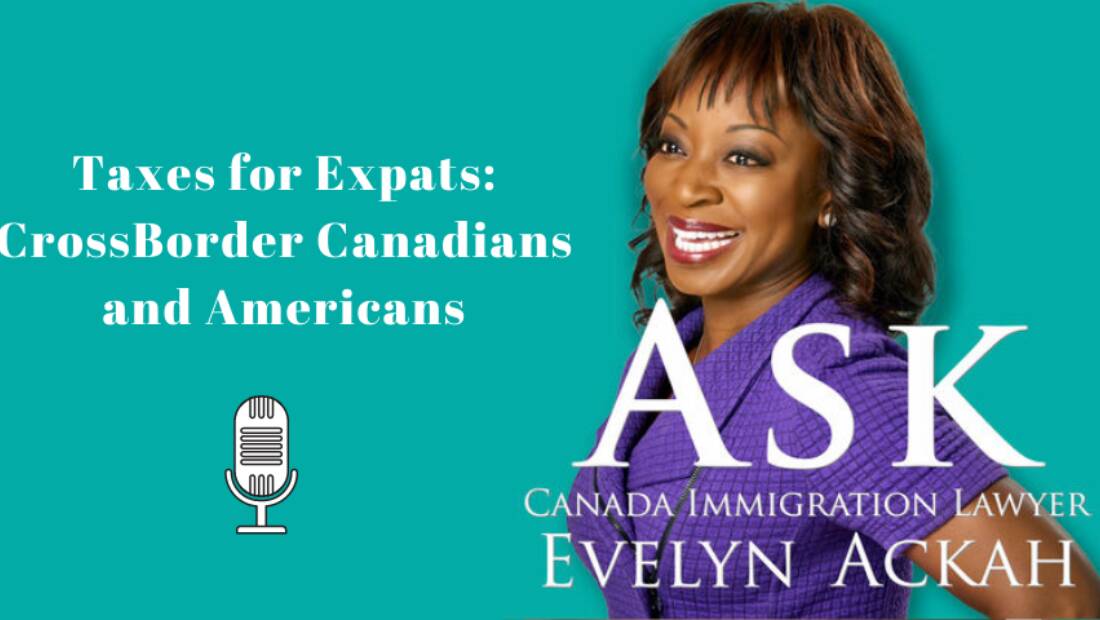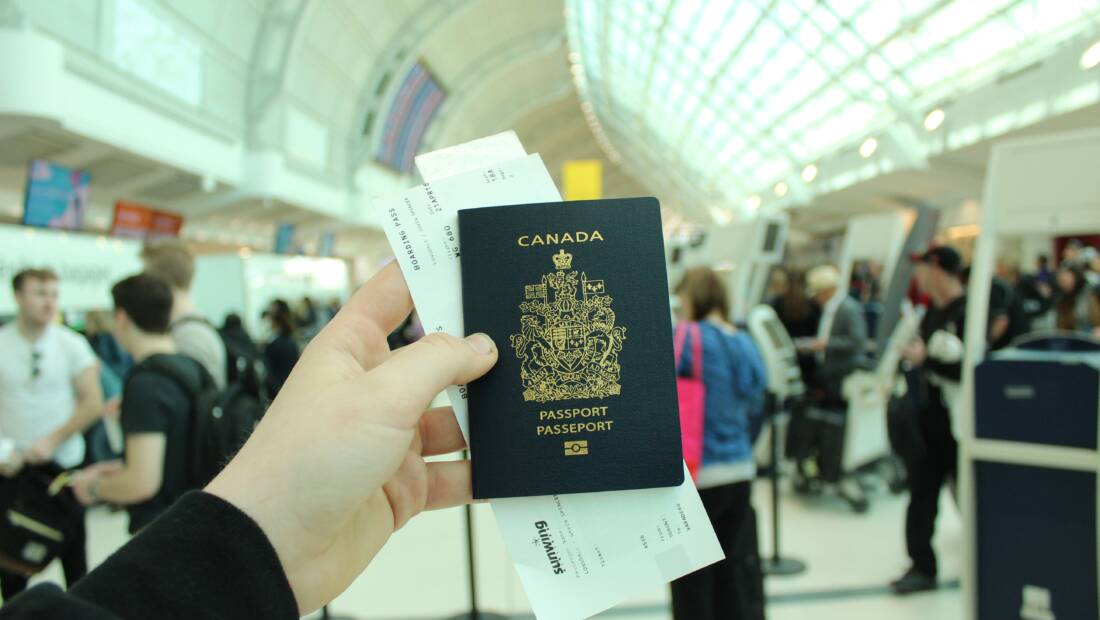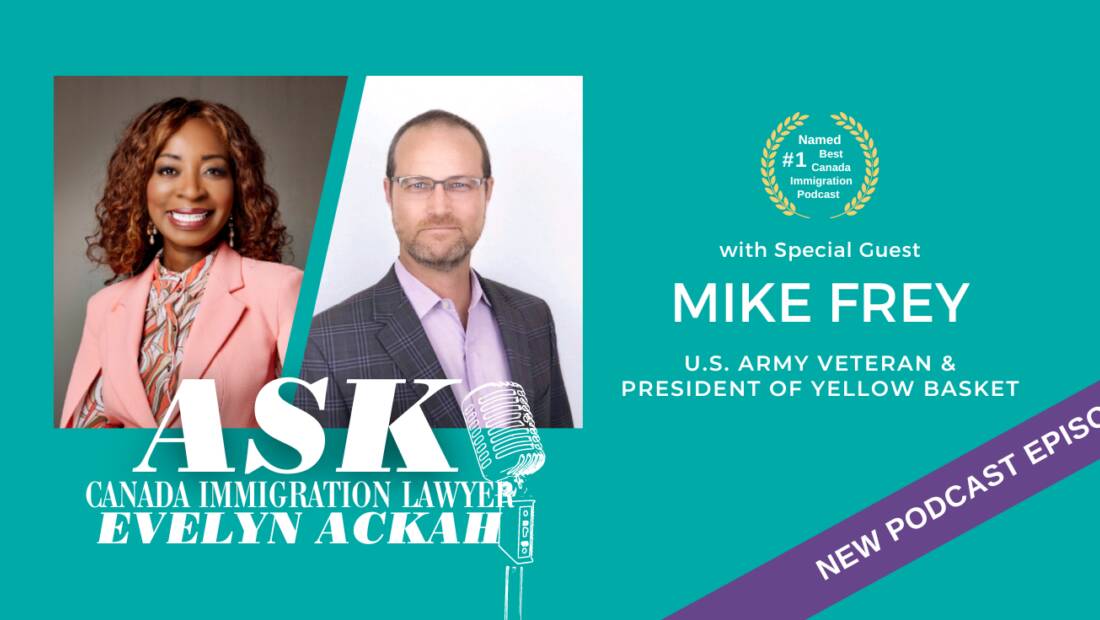Or listen on your favourite podcast app
The close proximity of Canada and the United States offers business immigration opportunities for citizens of both countries - and can result in cross-border tax issues for expats:
- Tax Information for Americans Living and Working in Canada
- Tax Information for Canadians Living and Working in the United States
Canada Immigration Lawyer Evelyn Ackah and Cross Border and International Tax Expert James Belesiotis discuss cross-border immigration and tax law.
- Is now a good time to open a branch office in Canada?
- How do salaries and income taxes compare for H-1B visa holders or applicants who decide to move to Canada?
- If you’re not a Canadian citizen, do you have to be a resident to open a business or branch in Canada?
- What tax benefits and incentives do foreign investors have to move to Canada?
Transcription
Evelyn Ackah:
Hello, this is Evelyn Ackah from Ackah Business Immigration Law, and I am so pleased to welcome you to a special Zoom meeting I'm having with my friend and tax advisor, James Belesiotis. Welcome, James.
James Belesiotis:
Welcome. Thank you.
Evelyn Ackah:
You're welcome. Thank you so much for being here, and before we start talking about all things cross-border taxed, I want to give you the introduction you deserve. So, I'm going to read a little bit.
Evelyn Ackah:
James is a well-respected practitioner, and he's a published authority on international tax. He holds lots of accreditation internationally, and he's also a practicing member of the Canadian Public Accountability Board, which sets audits, accounting and tax standards for listed companies. James has been an accredited tax specialist in public practice for more than 22 years, and he also does audits for listed and non-listed entities.
Evelyn Ackah:
There's so much more I can write about James. I know that he has been an incredible ally for me as a business owner, as well as my friend, in helping me understand the very complex rules on tax for corporations and individuals, and I'm thrilled to have you join us, James, because I want to talk about how we can work together to make sure our clients get the best advice before they move to Canada. So, welcome again, and thank you so much for being with us at Ackah Law.
James Belesiotis:
Thank you very much. I look forward to speaking to you. Thank you.
Evelyn Ackah:
So let me just get into it right away. So let's talk about, I get a lot of calls from companies where they're maybe in the United States and they want to set up a branch. Especially now. Unfortunately, some of the politics in the States, a lot of Silicon Valley companies and other high tech companies are looking to set up branches or subsidiaries to bring some of their foreign workers into Canada. What do they need to think about before they decide on the structure of the Canadian entity?
James Belesiotis:
That's a very good question. Companies migrating to Canada have to consider multiple factors, including not only tax, but also our local employment laws, our local estate laws, and other various aspects of their business because remember, Canada has a fundamentally different basis of law than the United States. One specific area that's going to be problematic for what I call non-listed or privately held US companies in Canada, is the concept of Canadian-control. Canadian-controlled public corporations enjoy a 9% federal tax rate, and when that control is not Canadian or held by a non-resident, it actually increases the federal tax burden by $145,000 every year, and that's before Provincial tax is imposed.
James Belesiotis:
So that's a very problematic area for companies, so really, it comes down to if you're going to move to Canada, it may make sense to have Canadian resident control, and how that control exists, of course, well, as lawyers we develop documents and policies and that sort of stuff to occur, but Canadian control is a key area. The other thing that is misunderstood is regulation 105. Most non-non-residents of Canada will hire other non-residents to do their business on their behalf in Canada, and they don't realize that that does create a [inaudible 00:03:37] reporting event of a 15% withholding tax, and most companies fail to comply or even do that. Of course, that is subject to penalties and it could range from 2,500 to $10,000 per year.
Evelyn Ackah:
So, James, so for instance, when I get the call and somebody says, "I want to set up a related entity in Canada. Should I do it as a branch, a subsidiary, or just register the same company in Canada?" What kind of implications are there for which structure they choose?
James Belesiotis:
That's a very good question, too. US companies that do earn income in Canada, for the most part, are exempt from Canadian tax, providing a treaty allows for this. However, basically, to achieve proper efficiency in the tax model, tax, when considered, it is a multidimensional model. We [inaudible 00:04:34] the type of income, the type of taxpayer, the level of income, and perhaps even the resident state that it's coming from, into the tax formula. So the treaty does exempt US profits from the Canadian system, provided it is a permanent establishment.
James Belesiotis:
So, companies that are selling, and depending on the type of business that we're referring to, do in fact require permanent establishment, and immigration into the Canadian system, not only from a relocational viewpoint, but also from a unemploy migration, for example, we know now with the current pandemic, there's multitude of our country, and our minister of finance is, in fact, supporting Canada and their business models much differently than the United States, and that's definitely because a different economy, different GDP factor, different interest rates, even, to an extent. We have a type Basel two financial network that the United States does not comply with, in other words, we have a concentrated bank network as opposed to a deregulated network.
James Belesiotis:
So all of these things matter and impact your overall position. In terms of the type of industry, sometimes if you're a software developer in the US or perhaps a gamer, that's developing what I call new world technology, you may very well have to be resident of Canada with employees because [inaudible 00:06:11] for example, is providing digital tax, enforcing it. CRA is now developing new laws on that as well. So, from one viewpoint, sometimes it's better to embrace the system than try to fight it. Keep in mind if you're an American coming into Canada, your dollar buys a lot more in Canada than it does in the US, because of the exchange. So let's say the tax right was the same, but you're paying less tax by virtue of the fact that you're making a game on your US currency to fund Canadian talk, so that in itself is a tax reduction, and that's why I believe Canada is an attractive place for foreign investment.
Evelyn Ackah:
For sure. One of the questions I get to last a lot is, "Will I be dinged on both sides of the border?" For instance, we have a business person who is setting up a partnership in Canada, and he's coming into one of the provinces and trying to figure out, and living, will be moving to Canada. Most of our immigration clients, they actually live in Canada. So, we set up the business, they transfer employees, and they hire Canadian, so it's not ever done to just set up a business. They are actually, for immigration, have to operate the business, and so they need to have employees and be operational, pay Canadian tax, all of it. But is there a way, do we think about that do they have to pay taxes in Canada and the US? Or they at least have to file? Just high level, James. I know you're in the weeds, you're an expert in tax, but for the layperson, they just want to understand, "Does this mean I have to follow US and Canadian tax going forward now that I'm working in Canada?"
James Belesiotis:
That's of course a very interesting question and a very common question, and in fact, the problem comes down to the US tax market or the tax code, we call it. Once you have a green card, you will continue reporting worldwide income into the United States tax market until you give up that green card. Now, that's assuming-
Evelyn Ackah:
But what about if you're a citizen? What if you're a US citizen? Is it the same?
James Belesiotis:
It's the same.
Evelyn Ackah:
Okay.
James Belesiotis:
So, the goal here is, if you're going to move into Canada and you're not going to create a Canadian structure, then there is a form, I wouldn't say double tax, but tax inefficiency that occurs because the foreign tax credits that do exist between the countries don't exactly give you 100% relief, but that doesn't mean, though, that you wouldn't do it. For example, we have opportunities in our tax legislation that are very different from the United States, so it may very well in some cases would be beneficial for a nonresident to operate in Canada, knowing that there is that inefficiency. Again, as an example of this, take dividends. Recently, our minister of finance brought in specific rules on tax, on split income dividends, typically from a holding company that are split between a husband and a wife, or a spouse, would be subject to the highest marginal rate, except for the fact unless you're 65 or a nonresident.
James Belesiotis:
So in that case, you could actually achieve perhaps a lower tax rate in Canada than the US by simply having the foreign tax credit applied and avoiding tax on split income. So, in cases like that, there are benefits that accrue to non-residents. However, what do they do? I think ultimately it depends on where people live. In your comment, you said to me, people live in Canada, so if they're living in Canada while keeping a US residency, you have to ask yourself why. In some cases, they do that because they don't want to pay the departure tax to the United States. There is such a huge amount of exemption in the US, as you know, or in other cases, they're worried that they don't want to be subject to long-term tax.
James Belesiotis:
However, the biggest thing I will say to you that I think is really beneficial, is that remember that the US has generation-skipping tax and gift tax. Thankfully, Canada does not have. We have income attribution rules where income is attributed to minors and kiddie tax. However, we don't have gift tax as you know it, as the US has it, and I think that that's something that's really the core issue of a decision. If you're going to be an American living in Canada, you're still subject to the gift tax, even if the assets is in Canada.
Evelyn Ackah:
Okay. So do you, for instance, in terms of advising, when I send some of our clients to you and say, "Before we do any immigration, you have to talk to James Belesiotis at his accounting firm, because we want to make sure you planned properly." So let's say a high net worth executive, lots of money in the States, in their investments and their 401s and all those other things, do you advise them on what they should do in advance to prepare for departing the US to come and take up this executive role in Canada? What do they need to do to make sure they're not going to somehow impact or negatively impact their wealth when they are leaving? Do you do that as well?
James Belesiotis:
Yeah, so that's interesting. Canada and the US have departure tax when we leave one state and come to the other, and the exemption is typically two million in the US, and US regulation [inaudible 00:12:20] does in fact require that you remit tax on any net assets over two million. With a pandemic, we've seen for the first time an unprecedented change of wealth between taxpayers. In some cases, this may be a great time to depart the US, if that's something that you're looking to do, and your job is requiring, because your assets may be just below the $2 million threshold.
James Belesiotis:
And in doing that, one thing that we do say to people is that if you're under 59 and a half years old, there is a 10% penalty to move your IRA or 401K over to an RRSP. Anybody over 59 and a half just pay withholding tax. So it's really the timing I think, is something to consider. For example, if your assets are worth $2,000,150, and the markets look like the way they are these days, you may very well want to do it at a time when you're under that $2 million threshold, as an example, so timing can be a friend in this case, or it could be a cost.
Evelyn Ackah:
So then the other thing is, sometimes people come up and they become expats for two or three years, and they know they're going back., What should they do? Should they just leave everything? Because my view is, why would you do it all, bring it over and then have to deal with the impact of tax perspective, and then go back again and deal with that. So if you know, let's say you're doing a temporary assignment for three years, doesn't it make more sense to just maybe freeze things and leave them, from a wealth management perspective?
James Belesiotis:
One thing that to get very problematic in Canada, is the word, "Residency," for the purpose of taxation is not defined in the federal tax act, and therefore we look at someone's intent, and so if the intent is that they're not going to longterm have residence in Canada, creating less ties into our tax system is a very good thing. Not bringing assets over, not buying a house, perhaps renting, keeping their driver's license in the United States, all become relevant factors in addition to other determination rules that the tax department will use.
James Belesiotis:
It's not entirely clear. It's done on a case by case fact on what the determination rules on what order in you apply because they are very factual. However, unlike the US, however, that is different. The US does have very clear determination rules of when you're a resident or not. The presence of a green card of course would keep you there resident, but keep in mind though that there are income that if you are going to keep your green card, there are exemptions of income, so they're not double taxed exactly the way people would envision them. For example, certain income that you earn in Canada while in Canada while keeping a green card is not exactly taxed 100% in the US, or reported in the same capacity, so that's something to consider as well.
Evelyn Ackah:
For sure. So this is my personal question. As you know, one of my children is American citizen, as well as Canadian, and I understand when he gets to be 18, we got to think about what we want to do, if we're going to keep his US citizenship or give it up because of the potential worldwide tax issues with the US government. What are your thoughts on that for people? Because I remember a few years ago, everybody, I knew that was an American living in Canada, who even became a Canadian citizen, they were making decisions to give up their citizenship because the last administration changed the rules and they were being dinged significantly, or they hadn't filed taxes for 20 years, because they've been citizens of Canada. What are your thoughts on that?
James Belesiotis:
That is such a complicated question, but I will answer it this way because it has so many variables and facts to it, but yeah I spy more and more, and [inaudible 00:16:35] will agree with me that asset protection divorce continues to be a concern for most Canadians, or most Americans as well. The risk of it, and during divorce, as you know, it is the biggest form of capital depletion for taxpayers or individuals, and so therefore the use of a family trust is becoming more and more relevant. That trust does have some concerns as it relates to non-residents. For example, the residency of a Canadian family trust is defined by the residence of its trustees.
James Belesiotis:
So if you have an American or a dual citizen as a trustee, that could be problematic for the residence of a trustee. You could pull that trust into another tax jurisdiction accidentally, and also non-resident as a beneficiary of a trust is subject to withholding tax. That we do find, but these things, however, may be moot, because what's the value of asset protection? Would you rather pay withholding tax and hopefully use other tax planning techniques to reduce it later on, or would you rather split your assets with your spouse that you're leaving?
James Belesiotis:
We've talked about, you and I sometimes, about the use of prenuptials, and prenuptials are only valuable in the state, not where you sign them, but in the state that you divorced. So you could very well be in a state, in a province of Canada, sign a prenuptial, but then very well get divorced in another province, or perhaps God forbid in the US, or now you're older and perhaps in Florida or California, where there is no legal consideration to that. So my point is, no. The answer is no, I wouldn't be rushing to remove residence in the dual citizen. However, there are reporting conditions. A dual citizen of United States and Canada does have to file.
Evelyn Ackah:
Has to file. And so what was happening, wasn't it back then, [inaudible 00:19:04] Obama administration, a lot of people hadn't filed for years and years and years, and then did you see a big uptick in your business or people coming to you saying, "Oh my God, I am 10 years behind and now they're coming after me." Did you see that?
James Belesiotis:
It's funny. We were just talking about trusts. This whole matter stemmed from the Panama disclosures where people were holding offshore money in Grand Cayman and Turks and Caicos and other countries like, and they had simply not reported the income on those assets, and really, that was the issue. People think that by simply keeping an asset in another country, it's sheltered, and therefore not reportable or not taxed. That is simply not true.
James Belesiotis:
Worldwide income is worldwide income. If you're a resident of Canada, you report worldwide. However, what I find is the more problematic area is the disclosure of foreign assets. Sometimes you can have an asset in the United States, perhaps another property that's not even generating income, perhaps you're breaking even and you're holding on a speculation basis, and you're not reporting that asset in the US or Canada, depending on what side of the country you're in, and both of our countries have significant disclosures. The US has FBAR reporting, we call it foreign asset reporting. Canada, of course, has the T1135 form, and there are severe penalties for failure to disclose.
Evelyn Ackah:
Okay, that's good. Wow. Oh, my goodness. Every time I've talked tax, it just goes over my head. This is why I don't do any. At Ackah Law, we don't do any tax. We refer our people to James and to other advisors because it's so complicated that we want to make sure, I don't want to hear from a client five years later, "Oh yeah. Wish you had told me I had to do this." I always, always, always say tax leads immigration, and especially for corporations that are moving, nearshoring, when they're coming from the US or India or wherever, to Canada, they need to plant at the highest level so that they have the best chances of success in Canada to grow their business and employ Canadians, which is always the goal.
Evelyn Ackah:
Is there anything else you want to talk about in terms of just, this is one of maybe many chats we're going to have James, as time goes on because I find that the tax questions and foreign corporate business clients are becoming more and more sophisticated and we send them to you. For instance, what about the individual executive? Should they seek their own tax advisor separately from the company's advisor when they're considering taking an opportunity? We get a lot of high-level c-suites, and I feel like they need to have almost an independent advisor for their own planning.
James Belesiotis:
That makes a 100% sense, and we do recommend that. There's a lot of reasons for that. First of all, an executive of a company may not feel comfortable disclosing their assets to someone that's related and paid by the corporation, for a lot of reasons. Confidentiality could be compromised because you're talking to someone where inherently doesn't exist, but moreover, there may be circumstances there that there could be bias. Remember that internal individual is reporting and has a responsibility to its shareholders of that company, and certainly not to the executive. So, absolutely, it's relevant and important because we've seen circumstances we're in, I've seen circumstances anyway, where the lack of that seek of knowledge can in fact create unexpected tax results in both countries.
Evelyn Ackah:
For sure. For sure, and so even if let's say the employer, a corporate employer is paying for, they'll say, "We're going to pay for your Canadian tax and deal with the equalization or the differences, we're going to pay for that, and you go find your advisor," it doesn't matter who's paying for that, right? It's the-
James Belesiotis:
Yeah, absolutely. The payment itself, the agreement tends to be with the professional and the client, not with the company. So although CPAs in Canada don't have a privilege as lawyers do in Canada, but we do have strict confidentiality for sure.
Evelyn Ackah:
Excellent. Well, thank you so much, James. This has been a good start of maybe a series, I hope. I really, really appreciate your time, and as I was saying, James is my accountant for the company, and personally, I really respect him. He has brought a lot of expertise and knowledge and structure and strategy, because I didn't have it, even though I'd been practicing law for 20 years, and working on my own for 10 years. As a lawyer, you know your niche and you need to bring in professionals who know what they're doing and can help you with the big picture planning. So, I'm hoping that we'll be able to do this again soon. Thank you so much for your time, and again, I'm so grateful to you for everything you've done for me and my business, and I look forward to sending more work your way. Thank you, James. Thank you so much.
James Belesiotis:
You're wonderful. Thank you.
Evelyn Ackah:
You're wonderful. Thank you.












